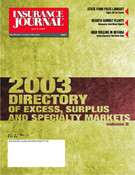 The fireworks, bright lights and loud noises emanating from Nevada is not the Las Vegas strip, it is actually the final weeks of legislative debate in the state capital in Carson City.
The fireworks, bright lights and loud noises emanating from Nevada is not the Las Vegas strip, it is actually the final weeks of legislative debate in the state capital in Carson City.
Once again the Nevada legislature has debated thousands of bills and insurance issues have sparked great controversy and attention. At the time this column went to print, legislators were still duking it out as they approached the June 2nd deadline to adjourn the session.
Nevada legislators debated many important personal and commercial insurance issues in 2003. Insurers successfully lobbied to defeat a measure, AB 280 by Christina Giunchigliani (D) which would have required all auto insurance policies to include $2,000 in medical payments. This bill remains in the Senate Labor and Commerce Committee and is unlikely to move this year. This bill would have increased auto insurance rates for Nevada drivers. Nevada already has the 7th highest auto insurance rates in the nation. This bill would have forced consumers to purchase medical coverage they do not need because they are already covered by health insurance.
Insurers also lobbied against a measure, AB 367 by Vonne Chowning (D), which would have banned insurers from offering policyholders a list of recommended body shops to use for auto repairs. This bill has now been amended to require insurers to notify consumers of their right to use any auto body shop they would like which is consistent with similar laws in other states.
Like many states across the country, credit scoring was a hot topic in the Nevada Legislature. Assemblymember Barbara Buckley (D) authored a measure, AB 194, to completely ban insurers from using credit scoring in the rating or underwriting of auto and homeowners insurance. The Assembly Democratic Majority made the banning of credit scoring one of their top legislative priorities for the 2003 session. Despite the insurance industry’s aggressive opposition, AB 194 moved all the way through the Assembly and over to the Senate Labor and Commerce Committee.
A political battle ensued when the bill to ban credit scoring was never heard in the Senate. The author of AB 194 amended her language into a bill still moving in the Assembly and added language to ban the use of credit scoring in commercial lines as well. The industry met with the author and explained that credit is not only a key tool in predicting losses in personal lines but especially accurate in accurately assessing risks in commercial lines. No other state in the country has banned the use of credit in commercial lines. The Assemblywoman has agreed to drop that language. The fate of this issue remains undecided and will go down to the wire and be decided in the last hours of the session.
Nevada’s major budget deficit has put tax issues front and center this year. The debate over taxes will continue until the final gavel goes down, but for now insurers have avoided major tax increases. Governor Kenny Guinn’s tax proposal on all gross receipts was killed in the Senate, but anything can still happen. There is concern that insurers’ investment income on premiums could be made subject to taxation and there are several proposals to levy a nine percent tax on financial institutions. Like credit scoring, this issue will not be decided until the very end of session.
The Nevada Trial Lawyers Association faced off against the Nevada building industry and insurers in a major battle to give builders the right to repair construction defects before a homeowner can file a lawsuit against a builder. The looming deadline to adjourn the 2003 session finally brought enough pressure for both sides to find a compromise and an agreement was reached on SB 241 which will give builders an opportunity to fix defects before homeowners can initiate litigation. The hope is that this measure will reduce litigation so insurers can once again accurately predict losses and price the product and more carriers will return to the commercial liability market.
Workers’ compensation has also been a big topic under the Nevada Capitol dome.
Governor Guinn recently signed into law legislation to increase benefits to workers injured on the job. AB 438, authored by Chad Christensen (R), will provide an automatic annual increase of 2.8 percent to workers that become permanently totally disabled from job related injuries or accidents.
There is also a package of bills being considered that would create an external review process in Nevada’s workers’ compensation system. Another measure would adopt the American Medical Association’s 5th edition of medical guidelines for the rating and treatment of permanent disabilities. Adoption of these new guidelines is estimated to increase workers’ compensation rates between two and eight percent. These new guidelines and regulations developed by the Department of Industrial Relations will take effect in 18 months.
Mark Sektnan is assistant vice president for the American Insurance Association (AIA). For more information, log onto www.aiadc.org.
Topics Carriers Auto Workers' Compensation
Was this article valuable?
Here are more articles you may enjoy.


 The $3 Trillion AI Data Center Build-Out Becomes All-Consuming for Debt Markets
The $3 Trillion AI Data Center Build-Out Becomes All-Consuming for Debt Markets  Zurich Insurance’s Beazley Bid Sets the Stage for More Insurance Deals
Zurich Insurance’s Beazley Bid Sets the Stage for More Insurance Deals  Chubb CEO Greenberg on Personal Insurance Affordability and Data Centers
Chubb CEO Greenberg on Personal Insurance Affordability and Data Centers  US Appeals Court Rejects Challenge to Trump’s Efforts to Ban DEI
US Appeals Court Rejects Challenge to Trump’s Efforts to Ban DEI 


